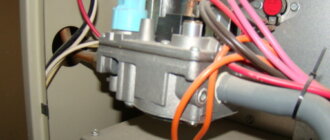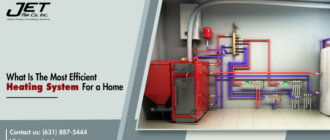Oil Furnace Repair
Introduction
Welcome to our blog on oil furnace repair! If you’re reading this, chances are your home is heated by an oil furnace. While these heating systems can be reliable and efficient, they do require maintenance and repairs from time to time. In this article, we’ll cover everything you need to know about common oil furnace problems, DIY troubleshooting tips, when it’s time to call in a professional, and how to choose the right contractor for your repair needs. So grab a cup of coffee (or tea), sit back and let’s get started!
How an Oil Furnace Works
An oil furnace is a heating system that uses oil to generate heat. The furnace works by burning fuel in the combustion chamber, which then heats up the air and distributes it through ductwork into your home.
The fuel is delivered from an oil tank located outside or inside your home through a pipeline into the furnace. The burner ignites the fuel using an electric spark, which creates heat energy that warms up the heat exchanger.
The heat exchanger transfers this warmth to the air passing over its surface, which then flows throughout your house via ducts. As soon as you set your thermostat to increase temperature, it sends a signal to turn on the oil furnace’s ignition system.
Once ignited, hot gases pass through a flue pipe directing them outside of your home while making sure that no harmful fumes enter indoors. This entire process repeats itself until reaching desired indoor temperatures.
Understanding how an oil furnace works can help you troubleshoot any issues with its operation and make sure it runs efficiently all winter long.
Types of Oil Furnaces
There are different types of oil furnaces that you can choose from for your heating needs. One of the most common types is the standard efficiency furnace, which operates at 80% to 85% AFUE (annual fuel utilization efficiency). This means that it converts 80-85% of the oil into heat and loses up to 20-15% through exhaust gases.
Another type is a high-efficiency furnace, which has an AFUE rating above 90%. These furnaces have better insulation and advanced combustion technology, resulting in less energy waste and lower heating bills.
A variable-speed blower motor furnace is another option. It uses a motor that adjusts its speed according to your home’s heating requirements, providing consistent warmth while saving energy.
There’s also a condensing furnace. This type utilizes heat exchangers to extract more heat from the burnt fuel than other models. As such, they boast some of the highest AFUE ratings on the market today.
Keep these options in mind when deciding on what kind of oil furnace suits your household’s budget and preferences best!
Common Oil Furnace Problems
Oil furnaces are commonly used to heat homes and buildings in areas where natural gas is not available. However, like any heating system, oil furnaces are prone to problems that can cause a lot of discomfort if not addressed promptly.
One of the most common problems with oil furnaces is a malfunctioning ignition system. This can be caused by faulty electrodes or a clogged nozzle, which prevents the fuel from igniting properly. Another issue that homeowners may encounter is dirty filters, which can restrict airflow and reduce efficiency.
A leaking oil tank or supply line is another serious problem that requires immediate attention from an experienced technician. A leak could potentially lead to an environmental hazard as well as damage your property’s structure.
Additionally, worn out bearings in the blower motor can cause excessive noise and vibration during operation. Damaged belt drives also prevent proper circulation of air through ductwork resulting in uneven heating throughout your home.
Regular maintenance can help reduce these potential issues, but it’s important to contact professionals for assistance when dealing with more complex repairs. Addressing these common furnace problems quickly will ensure efficient operation and keep you warm all winter long!
DIY Troubleshooting and Maintenance
DIY troubleshooting and maintenance of oil furnaces is an essential task for homeowners looking to save money on repairs. One common problem with oil furnaces is a lack of heat, which can be caused by clogged filters or fuel lines. To fix this issue, homeowners should first turn off the furnace and check the filter for dirt or debris. If it’s dirty, they should replace it with a new one.
Another issue that may arise is unusual noises coming from the furnace. This can indicate loose screws or bolts within the unit itself. Homeowners should inspect their furnace regularly and tighten any loose components as needed.
In addition to troubleshooting common problems, regular maintenance can also help prevent future issues from occurring altogether. Homeowners should schedule annual tune-ups with a professional technician who will clean and inspect their furnace thoroughly.
Furthermore, keeping up-to-date on regular maintenance tasks such as checking air filters every month can go a long way in extending the lifespan of your oil furnace while ensuring optimal efficiency levels.
By performing basic DIY troubleshooting and staying diligent about routine maintenance tasks throughout the year, homeowners can keep their oil furnaces running smoothly without breaking their budget on costly repairs down the road.
When to Call a Professional
When it comes to oil furnace repair, there are some issues that require the knowledge and expertise of a professional. While DIY troubleshooting and maintenance can be effective in addressing minor problems, certain repairs should only be handled by licensed professionals.
One sign that you need professional assistance is if your furnace is producing strange odors or making unusual noises. These could indicate serious issues with the system’s components, which require inspection and repair by an experienced technician.
Another reason to call a pro is if your furnace isn’t providing enough heat or not working at all. This could be due to electrical problems or faulty parts that require replacement. Attempting to fix these issues without proper training can lead to further damage or even create safety hazards.
If you notice any leaks from your oil furnace or suspect there might be a blockage in the fuel line, calling a professional right away is crucial. Oil spills can quickly become dangerous and expensive cleanup jobs, while blocked fuel lines can cause inefficiencies in heating performance and potential health risks.
Ultimately, knowing when it’s time to call a professional for oil furnace repair will help ensure safe operation of your heating system while prolonging its lifespan.
Choosing the Right Oil Furnace Repair Contractor
Choosing the right oil furnace repair contractor is crucial in ensuring that your furnace gets the proper attention and repairs it needs. Here are some factors to consider when making this decision.
Firstly, check if the company has a valid license and certification to carry out oil furnace repairs. This ensures that they have met minimum standards of proficiency in their field.
Secondly, consider their experience with repairing oil furnaces. Ask about how long they’ve been doing it and if they specialize in any particular brand or model.
Thirdly, read customer reviews online or ask for references from previous clients. See what others have said about their service quality, reliability, responsiveness, and professionalism.
Inquire about maintenance services offered by the contractor as regular maintenance can prevent costly repairs down the line.
By taking these factors into account when choosing an oil furnace repair contractor, you will be able to make an informed decision on who can best handle your specific needs while providing top-quality service at a reasonable price point.
Licensing and Certification
Licensing and certification are crucial factors to consider when hiring an oil furnace repair contractor. It’s important to ensure that the person you’re entrusting with your furnace is qualified and has the necessary training.
Firstly, make sure that the contractor has a valid license to operate in your state or region. This will give you peace of mind knowing that they have met certain requirements and regulations set by local authorities.
Secondly, check if the contractor holds any certifications from recognized organizations such as NATE (North American Technician Excellence). These certifications indicate that the technician has undergone rigorous training and passed exams in specific areas related to HVAC systems.
Don’t hesitate to ask for proof of licensing and certification before hiring a contractor. A reputable professional will be more than willing to provide this information upon request.
Always prioritize licensing and certification when choosing an oil furnace repair contractor. It can save you from potential problems down the line while ensuring efficient repairs for your heating system.
Experience with Oil Furnaces
Having extensive experience with oil furnaces is crucial when selecting a repair contractor. A skilled technician who has worked on numerous oil furnace models and brands will be able to diagnose problems more efficiently, saving you time and money in the long run.
Additionally, an experienced professional should have a deep understanding of the intricacies involved in repairing and maintaining various types of oil furnaces. They’ll know how to identify common issues specific to your furnace type, as well as any potential safety hazards that may arise during repairs.
Another essential aspect of experience lies in staying up-to-date with industry advancements. Oil furnace technology evolves continually, so it’s important for technicians to stay informed about the latest techniques and best practices for maintenance and repair work.
Finding a reputable contractor who prioritizes ongoing training ensures that they are prepared to tackle even the most challenging oil furnace issues. This level of expertise provides homeowners with peace of mind knowing their heating system is in capable hands.
Customer Reviews
Customer reviews are an essential aspect of any oil furnace repair contractor’s reputation. When considering hiring a professional for your oil furnace repairs, it is crucial to look at the experiences of previous customers. Reading through customer reviews can give you an idea of what to expect from the company and help you make an informed decision.
Positive customer reviews can provide insight into a company’s professionalism, quality of work, and level of customer service. It shows that they have satisfied clients who are willing to share their positive experiences with others.
On the other hand, negative reviews can indicate potential red flags or areas where the company needs improvement. However, it is important to note that not all negative reviews are accurate or truthful. Some may be due to miscommunication or unrealistic expectations on the part of the reviewer.
When reading through customer reviews, take note of common themes that arise in both positive and negative feedback. This will help you gain a better understanding of what aspects are consistently good or bad about the company.
Taking some time to research and read through customer reviews can save you time and money down the line by helping you choose a reputable oil furnace repair contractor for your needs.
The Importance of Regular Maintenance
Regular maintenance is essential to ensure the proper functioning of your oil furnace. Neglecting regular maintenance can lead to various issues, including high energy bills and frequent breakdowns. Therefore, it is important to schedule routine maintenance with a licensed professional.
During regular maintenance, a technician will inspect and clean various components of your furnace like the blower motor, heat exchanger, and fuel lines. They will also identify any potential problems that could result in costly repairs if left unnoticed.
In addition to reducing repair costs down the line, regular maintenance ensures that your oil furnace operates at maximum efficiency. A well-maintained system consumes less fuel while producing more heat, which means significant cost savings for you.
Moreover, neglecting regular maintenance increases the risk of carbon monoxide leaks; an odorless gas that can be fatal when not detected early enough. Regular inspections by professionals help detect such risks earlier before they become life-threatening.
Scheduling regular tune-ups for your oil furnace helps avoid expensive repairs down the road while ensuring safety and optimum performance all season long.
Conclusion
To sum it up, oil furnace repair is an essential part of homeownership. It’s important to understand how your furnace works, the common problems that can arise, and how you can troubleshoot them on your own. However, it’s also crucial to know when it’s time to call a professional.
Choosing the right contractor for oil furnace repairs requires careful consideration of their licensing, certification, and experience working with oil furnaces. Reading customer reviews is also vital in ensuring you select a reputable company.
Remember that regular maintenance is key in preventing costly repairs down the line. By taking care of your oil furnace through frequent inspections and cleaning, you’re not only increasing its lifespan but also saving yourself money in the long term.
We hope this article has provided valuable insights into oil furnace repair and encouraged you to take proper care of your heating system.



